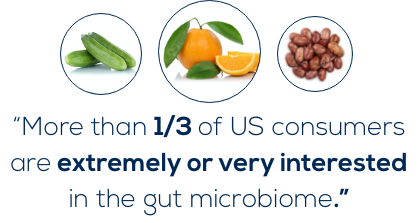Functional Nutrition Trends: Immunity-Boosting Ingredients
Natural ingredients including fruits, vegetables and botanicals, as well as prebiotics and probiotics, can help food and beverage manufacturers meet these demands and take advantage of growing opportunities in the food and nutritional supplements market.
COVID-19 accelerates interest in immune health, fruits, and vegetables
A May 2020 survey from consumer market research firm FMCG Gurus1 revealed that 57% of global consumers have become more concerned about their immunity as a result of COVID-19, with many recognizing the immune health benefits of eating more plant-based foods. A majority of survey participants (58%) planned to increase their intake of fruit as a result of COVID-19, and 41% planned to increase their intake of vegetables.
According to Mintel2, herbal, fruit, and vegetable extracts are common in many food and drink products claiming to enhance immunity. Trending ingredients include ginger, beetroot, kale, and tropical fruits like berries, dragonfruit and kiwi.

Gut microbiome is linked to immune function
Probiotics and prebiotics are also increasingly being used in products with immunity claims. Consumers are learning more about how to manage their digestive health, with more than one-third (37%) of U.S. consumers reporting they are extremely or very interested in the gut microbiome.3 Researchers continue to explore the link between the gut microbiome and overall immune health. 
For example, prebiotics, a type of dietary fiber found primarily in fruit, vegetables and legumes, help create healthy bacteria that aid in digestion, and may offer important immunity benefits as well. Inulin, a prebiotic naturally found in vegetables like sugar beets and chicory roots, is being studied for its ability to increase cytokine secretion and the activity of natural killer cells, thereby boosting immune response.
Freeze-drying preserves important nutraceutical attributes in fruits and vegetables
Freeze-dried fruits and vegetables can be a valuable addition to immunity-focused food and beverage products. The freeze-drying process not only preserves the natural shape, color and flavor of fruit and vegetables, it also helps retain key nutrients. In certain fruits, such as tomatoes and blueberries, freeze-drying has been shown to release additional antioxidant compounds that are trapped in the walls of the plant cells. These antioxidant properties can offer therapeutic and preventative health benefits, such as reducing inflammation and protecting against certain diseases and cancers.4With no added sugars, artificial preservatives or carriers, freeze-dried ingredients also sync with consumers’ desire for clean-label ingredients and healthier formulations.
Whether you are working on something new or reformulating to meet new guidelines, our team can work with you to find a solution that adds value. Check out our ideas for functional food innovation with freeze-dried fruits and vegetables, or contact us today at customerservices@chaucerfoods.com.
Resources:
1. “Are Consumer Habits Changing Due to COVID-19?” FMCG Gurus. May 13, 2020.
2. “Patent Insights: Boosting Immune Health A Future Focus,” Mintel. April 27, 2020
3. USA Trend Study. HealthFocus. 2019.
4. Serna-Cock et al. (2015) Structural, physical, functional and nutraceutical changes of freeze-dried fruit. African Journal of Biotechnology. 14(6): 442-450